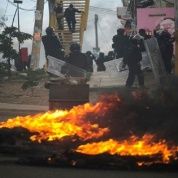The current teachers conflict in Oaxaca seems to turn more violent by the day with international and local media simply presenting it as a battle between “radical” teachers and police forces trying to counter them.

PHOTO GALLERY:
Brutal Crackdown Confronts Teachers' Strike in Oaxaca
But it is not.
The conflict is happening in one of the poorest areas of Southern Mexico, historically hit by violence and poverty. However, it is also the cradle of grassroots movements and the revolutionary tradition that has marked contemporary politics in Mexico.
Violence has escalated to worrying levels in Oaxaca, where government and police repression has claimed the lives of at least eight teachers and has left dozens injured and others arrested during the ongoing protests.
“What we see in Oaxaca is a group of completely unarmed and peaceful teachers who are defending their jobs, who are defending the humanistic and critical tradition of education in Mexico and on the other side we have the government who’s trying to impose its so-called education reform on these teachers,” academic and analyst John M. Ackerman told teleSUR.
According to Ackerman, the government of President Enrique Peña Nieto is not trying to negotiate the unpopular education reform at the heart of the conflict with the protesting teachers. Instead, authorities have been provoking more protests, especially after the arrest of the two main leaders of the teachers union known as CNTE and 30 other teachers who have been charged with provoking violence and have been sent to jails in Northen Mexico, miles and miles away from their home town.
“Teachers were asking to negotiate the reform, but now authorities have took the conflict to another level, not only by jailing union leaders, but now by directly attacking and killing protesting teachers.”
“Teachers were asking to negotiate the reform, but now authorities have taken the conflict to another level, not only by jailing union leaders, but now by directly attacking and killing protesting teachers,” said Ackerman.
Protests began in 2013 when Peña Nieto introduced a total of 11 neoliberal structural reforms during his first 20 months of government, with education being the first. But the protests and the general strike resumed last May after the government refused to negotiate with teachers, who reject the evaluations contained in the law that so far has led to the dismissal of nearly 10,000 people.
The government plans to lay off tens of thousands more and has also threatened those who are attending the massive protests. The CNTE union has more than 100,000 members and numerous local unions, and groups have joined the general strike in Tabasco, Chiapas, Guerrero and Mexico City.
Ackerman explains that “the so-called education reform” was dictated by international organizations like the World Bank and the OECD.
“This reform is not about education, it is not about improving textbooks, extending class hours or renovating schools facilities, it is about firing and punishing teachers who do not fit the neoliberal standards of the law. It tries to get rid of the revolutionary tradition that has persisted in education since the early 1920s,” said Ackerman.
Striking teachers have largely complained that the tests imposed by the controversial law do not effectively measure teaching skills, like the special knowledge and demeanor needed to teach in rural areas and Indigenous communities.
RELATED:
Mexican Police Kill 9 in Clashes with Striking Oaxaca Teachers
“Mexico’s government wants these teachers to be technocrats and not real technocrats because what the reform is doing is separating the connection between the teacher trainee colleges and the new teachers, because before there was a training process and now they want to send anyone who holds a college degree to teach anywhere in Mexico,” said Ackerman.
But despite the government's refusal to discuss the reform and the violence and repression of recent days, Ackerman is optimistic that the new “political conjuncture” created by thousands of leftist people and organizations who support the teachers' cause, including the progressive Morena party, will help to make real changes happen in Mexico in the immediate future.
Ackerman explains that these kind of movements are happening in “deep Mexico"—Oaxaca, Chiapas, Guerrero and Tabasco — an area that hosts most of the country's total population with a powerful Indigenous heritage and a more developed political consciousness and critique of authoritarianism.
Teachers have pledged to continue their protests until their demands are met, showing that no intimidation or repression will stop them from fighting for what is their constitutional right. However, they have a powerful enemy—the Mexican media. Dominated by two monopolies aligned to power, Mexico's mainstream media do nothing but unscrupulously show the teachers as radical and violent.